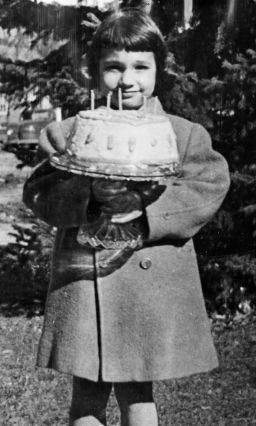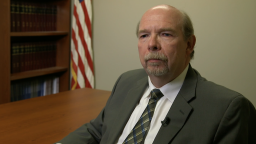Story highlights
"John Doe," cold case informant, says he was beaten in prison after leak of his identity
In $10 million suit, inmate says he was told to lie about deal to testify in murder case
An inmate credited with helping to secure a conviction in the nation’s oldest cold case murder trial now alleges that police and prosecutors promised him favors in exchange for his testimony, instructed him to lie about those promises and then failed to hold up their end of the bargain.
The inmate, known publicly only as John Doe, recently filed a federal lawsuit in Illinois, adding even more intrigue to a case now mired in controversy. The conviction in the 1957 case was overturned earlier this year, and the man Doe testified against in 2012 was set free.
Doe alleges in the lawsuit that police and prosecutors broke every promise they made to him once they gained his testimony. He does not say that he gave false testimony about conversations he had with the accused – only that he was told to lie if asked if he’d been promised anything.
His biggest concern was being exposed in prison as a “snitch,” and so he sought anonymity. With the help of prosecutors, his identity was shielded by a court gag order that allowed him to testify as “John Doe.”

Read the original series: "Taken"
But, the lawsuit alleges, his identity was disclosed to other prosecution witnesses – the defendant’s half-sisters. Just days after his testimony, the women wrote thank-you notes to Doe in prison using his true name. His mail was screened by at least three prison employees, the suit states, and initially was delivered to the wrong cell and read by other inmates.
Before long, Doe’s secret was out.
Guards congratulated him for “doing the right thing,” he says, but five inmates cornered him in a prison shower in June 2013, kicking and beating him. He described the assault in the suit, saying he “believed he would be stomped to death or rendered unconscious and defenseless, naked in the shower.”
He says he was wrapped in towels to conceal his injuries and whisked by other inmates up the back stairs to his cell, where he spent two weeks recovering from cuts and bruises. His account appears to be verified by affidavits from other inmates who say they heard or saw the shower assault.
The prison’s internal affairs officers investigated, the suit says, and Doe was moved to another part of the prison, where he was again confronted and accused of being a snitch. He was assaulted a second time and says he continues to face rumors, accusations and threats and that his appeals to Illinois’ state courts have fallen on deaf ears.
The Illinois State Police and the Illinois Department of Corrections declined to comment, saying they can’t speak about matters in litigation.

If Doe’s allegations are determined to be true, everyone involved in the 2012 prosecution of Jack Daniel McCullough could face serious repercussions. Making promises to secure testimony from inmates is frowned upon because it severely diminishes their credibility. And violating a judge’s gag order can lead to a finding of contempt of court, punishable by sanctions that include jail time, fines or exclusion of the witness’ testimony.
McCullough was convicted of murder and kidnapping in the case of 7-year-old Maria Ridulph, who disappeared from a street in Sycamore, about an hour’s drive west of Chicago, in 1957. Her body was found months later near the Illinois-Iowa border.
McCullough was serving a life sentence. His conviction was overturned and the charges dismissed in April, and he was set free. He has since returned to Seattle.
CNN is aware of Doe’s true name but will refer to him as John Doe in accordance with the gag order and the inmate’s ongoing concern for his safety. He is a convicted murderer serving a life sentence; CNN is not publishing details of his crime because they might reveal his identity.
Illinois corrections officials would not say whether Doe is under increased security. And they could not confirm whether or not he was beaten in the shower as he describes. CNN has filed a public records request seeking details that could either confirm or dispute Doe’s version of events, but future litigation could limit what records are made available.
‘We have slayed our dragon’
On its face, Doe’s complaint reveals how quickly the court order shielding his identity may have been breached. He testified against McCullough on September 12, 2012, and says he received the thank-you notes on September 21 – nine days later.
Mary Hunt identified herself in her note as “stepsister of the monster.” She offered thanks “from the bottom of my heart,” adding, “Your courage meant so much to myself and my family. ‘Heroes take journeys, confront dragons, and discover the treasure of their true selves.’ I believe we have slayed our dragon.”
“Our family’s shame has been a rough journey for us all,” Hunt continued. “It took us many years to come forward. Last week was a week of emotions that ranged from deep sadness, anxiety and elation. When I saw you leave the courtroom I wanted to hug tightly and tell you how much we appreciated your testimony. I was only able to briefly tell you thank you. Consider this letter a hug.”
Another half sister, Jeanne Tessier, sent a card with a brief note: “I am so grateful to you for helping make right a long-ago wrong. Your courage is awe-inspiring. I will hold you in my heart and in my prayers forever. The love and gratitude of many flows your way.”
Doe attached copies of the letters to his lawsuit.

Among the defendants named in the legal action are a police investigator and prosecutor who played prominent roles in McCullough’s trial. They are Special Agent Brion Hanley of the Illinois State Police and prosecutor Julie Trevarthen, who has since left the DeKalb County state’s attorney’s office for private practice. Neither responded to CNN’s requests for comment.
The thank-you notes were addressed to the inmate under his true name and included his prison identification number, indicating somebody with close knowledge of the case likely supplied those.
Doe claims he has evidence that Trevarthen was in contact with the defendant’s half sisters after the trial through email, messaging and Facebook. He says he believes Trevarthen disclosed his identity to them “and potentially others.”
He says he continues to live in fear for his safety and seeks enforcement of the terms he negotiated for his testimony and as much as $10 million in damages.
“Plaintiff wakes up each day with the reality of not knowing when he will be confronted again and/or physically assaulted, beaten, stabbed or killed,” the suit states, “and he continues to suffer repeated humiliation, constant fear, anxiety, sleep deprivation, deep depression, despair, rage and other physical and psychological effects.”
Doe was one of three inmates who testified at the trial of McCullough, a Vietnam veteran and former police officer who lived around the corner from Maria Ridulph at the time she vanished.
Witnesses from G-Block
The inmates spent time with McCullough on G-Block at the DeKalb County Jail after his arrest in the kidnapping and killing of the brown-eyed second-grader. Although details of their accounts differed, each inmate testified that McCullough admitted he had killed Maria. Doe was the only witness to testify anonymously.
Maria was playing in the snow with a friend on a Sycamore street corner when a stranger who called himself “Johnny” walked up and offered her a piggyback ride on the evening of December 3, 1957. Maria and “Johnny” vanished when her playmate went home to fetch a pair of mittens.
Maria’s disappearance triggered a massive volunteer search effort, brought more than three dozen FBI agents to Sycamore and captured the attention of President Dwight Eisenhower and FBI Director J. Edgar Hoover. For most of that December, agents checked out hundreds of tips and leads.
Even though they drained a lake and looked in basements, railroad cars and car trunks, searchers found nothing; 144 days later a Minnesota man looking for mushrooms in the woods found Maria’s body nestled under a fallen tree some 100 miles away in Woodbine, Illinois, near the Iowa border.
The case went unsolved until McCullough’s arrest in June 2011. Besides the inmates, his four-day trial featured testimony from the accusing half sisters, who long suspected their mother covered for him. Maria’s childhood friend, by then a grandmother, identified him as “Johnny” in the courtroom.
The Maria Ridulph case was featured in a five-part CNN digital series, “Taken,” which raised questions about the evidence used to convict McCullough. Among the issues addressed by the series: How reliable is inmate testimony? The primary credibility issue with informants is one of motive, analysts said. Jailhouse informants usually are motivated by a reduction in sentence or other special favors.
Others also had doubts, and the conviction started to unravel almost immediately.

A new prosecutor, Richard Schmack, was elected and took a second look at the evidence. Schmack concluded that McCullough couldn’t have committed the crime because records of a collect phone call he made supported his alibi he was 40 miles away in Rockford, trying to enlist in the U.S. Air Force, when Maria was taken. Recruiters also recalled speaking with him that evening and the following morning.
The FBI had checked out McCullough’s alibi and cleared him within days of Maria’s disappearance. But that information was improperly kept out of his trial, an appeals court ruled last year. Still, the court found the error “harmless” and said it would not have affected the trial’s outcome.
Schmack disagreed. His report on the case included disturbing signs of a disingenuous prosecution, including witness coaching, timeline tweaking, evidence manipulation, courtroom misrepresentations and the use of unreliable inmate testimony.
‘Magic words’
The case was tried without a jury and the judge, James Hallock, specifically cited the inmates’ testimony as credible and convincing.
John Doe has revealed his identity in a smattering of appellate filings, and Schmack took note of them in his report: “An informant who was permitted to testify under an alias has since filed pleadings, some under oath, which imply that he committed perjury in the trial, and that prosecutors knew and encouraged this.”
Doe says that after investigators approached him to testify, he expressed reluctance to cooperate, fearing retaliation from members of his former prison gang once they learned he was testifying for the prosecution. He insisted on anonymity and other concessions, including a lower security classification so he could transfer to another prison and serve his time with his father.
Hanley, the lead investigator for the state police, promised to make sure prosecutors didn’t disclose Doe’s identity, the suit says, and assured the inmate that he had “nothing to worry about.”
Doe also claims Hanley told him “that he could not use the words ‘deal’ or ‘promises’ as these were ‘magic words’ for the court and defense team of Jack McCullough.” According to the lawsuit, the investigator explained that “it would undermine the testimony and essentially aid the defense of a child murderer.”
Trevarthen, who handled most of the witnesses, obtained the gag order from the judge shielding Doe’s identity, and the inmate was rushed onto the witness stand a day before he expected to testify. She assured the court: “There’s no deal regarding his post-conviction petition.”
Doe himself denied being promised anything when asked about it in court: “No, sir, state didn’t promise me nothing.” But he later wrote to McCullough’s appellate lawyer, insisting the state’s attorney’s office “directed” him not to disclose any deal.
He says he turned to the judge, Hallock, when he completed his testimony, hoping to discuss the terms of his deal. But, the suit says, the judge cut him off, saying the witness could only speak in response to a question.
A review of filings in DeKalb County shows that Doe then spent three years trying to get the court’s attention. He wrote letters to judges and spoke with several lawyers, including McCullough’s public defender and investigator. He filed multiple complaints demanding an investigation, sanctions against the leaker and a court order redacting his name from all public court filings. But, for reasons that have yet to be explained, it took six months before one of his complaints was actually docketed, his suit states.
In his lawsuit, Doe documents what took place after he helped secure McCullough’s conviction. Besides the letters from the half sisters, he says he “met secretly” with Hanley in prison at the end of November 2012. Doe asserts that Hanley used a “covert name” – Quinn Brady – to sign into the prison visitor’s log. The log lists a nonexistent address for Quinn Brady and a number for a phone that has been disconnected.
Hanley is an avid college football fan; Brady Quinn was a star quarterback at Notre Dame.
‘Trouble brewing’
Doe says Hanley assured him he was still working on the “concessions” but that an election had shaken things up at the state’s attorney’s office. He said he was meeting with prison officials later that day to work on lowering Doe’s prison security classification.
A week later, Doe was back in court in Sycamore. But, according to another federal lawsuit, he was transported in a van smeared with feces from an escaped inmate who had hidden in raw sewage. Five days had passed, and the van had not been cleaned. Although he complained of being sickened during the van ride to Sycamore, the van was not cleaned for the return trip, either. Doe says he had to undergo tests for HIV and hepatitis and was given a tetanus shot.
But there was a glimmer of good news. At the courthouse, Doe says, Hanley informed him the warden had agreed to lower his classification.
By then, Doe was telling anybody who would listen that there was “trouble brewing” over prison rumors that he was the John Doe who testified for the prosecution in the McCullough case. He was reclassified about a month later, the suit says, but he has not been transferred.
In February 2013, according to the suit, Doe met with Crystal Harrolle, an investigator for the public defender’s office, while back in court in Sycamore. He says she asked why his prison scrubs were a different color, and he explained he’d been reclassified. She asked him why anyone would give him a lower classification. He told her Hanley had intervened on his behalf.
“And I was compelled to disclose that it was because I testified at McCullough’s trial,” Doe says in his lawsuit. “Ms. Harrolle asked if it was agreed upon before I testified and I responded yes. Ms. Harrolle asked whether the State’s Attorney’s office or Agent Hanley had made any other promises and I informed her they agreed not to assert a timeliness defense on my pending post-conviction petition and that the judge would just rule on the merits of each claim.”
She asked if the judge was aware of the arrangement, and he explained he tried to speak up but Hallock “made me leave the witness stand, telling me I couldn’t saying anything without being asked a direct question.”
Court officials in neighboring Kane County, where Hallock usually presides, did not respond to CNN’s request for comment from the judge. In the past, they have cited court rules prohibiting judges from commenting on the cases they decide.
Doe met with Harrolle a second time on a return visit to the courthouse in Sycamore. A year had passed since their last conversation. This time she brought Public Defender Tom McCulloch because Doe, clearly frustrated, was seeking legal advice on how to enforce the terms of his deal. They said they sympathized but couldn’t do anything for him because he wasn’t a client.
They did ask Doe which promises were kept, which weren’t, and why he didn’t testify about them at the trial, according to the suit. He again said that Hanley had told him not to mention his agreement at the trial.
The public defender told CNN he couldn’t comment because his office is no longer involved in the case. “Our role now is ‘observer,’ not ‘commenter,’” he said with a chuckle.
Doe’s appeal and requests for post-conviction relief ultimately were denied last year.
The quest for a special prosecutor
Besides raising questions about the use of informants in a prosecution now discredited by some, including Schmack, Doe’s suit could have a more immediate impact on Trevarthen’s role as a witness at an upcoming court hearing related to the Jack McCullough case.
Charles Ridulph, Maria’s brother, is seeking appointment of a special prosecutor to review Schmack’s actions and, perhaps, file new charges.
Ridulph, who was 11 when his sister was kidnapped and murdered, alleges that Schmack made a campaign promise to throw out the case. He considers McCullough’s release a miscarriage of justice and argues that Schmack had a conflict of interest – or at least the appearance of one.

Trevarthen has alleged in a pair of court declarations that she overheard Schmack, then a candidate for state’s attorney, vow to toss out the case on two occasions – in a courthouse lawyers’ lounge and in the courtroom.
Schmack defeated Trevarthen’s boss, Clay Campbell, by some 750 votes in an election held just a few weeks after McCullough’s conviction.
There’s no conflict, Schmack says in court filings, adding that new state ethics rules mandate that prosecutors take action when they encounter a wrongful conviction. He points out that his initial doubts hardened into a belief in McCullough’s innocence only after he reviewed the state’s attorney’s entire case file. And then he came up with new evidence by verifying the existence of the pay phone where McCullough made the collect call from Rockford at about the time Maria was being snatched from the corner in Sycamore.
The request for a special prosecutor, Schmack says, “has simply been dressed up with the assertion that the prosecutor ‘pre-judged’ the case, and is now conflicted as a result. There is no rational difference between a difference in conclusion which began before the prosecutor’s election and one that began afterward.”
Trevarthen has long been convinced that Schmack had a political agenda. Speaking with CNN in 2013, she and other members of the prosecution team expressed concern he would blow up their case. She says in her declaration that she often saw him schmoozing with the defense at McCullough’s murder trial.
In her court declaration, Trevarthen says she overheard Schmack openly criticize the case to other attorneys: “It’s ridiculous, the FBI cleared him in 1957,” she says she heard him say. “If I’m elected, it’s over.”
Trevarthen’s affidavits offer no dates or times of these conversations, and Trevarthen states that she can’t remember the names of any of the other lawyers who might have overheard the conversations.
She also may have a strong bias: One of the first things Schmack did upon assuming office was to fire Trevarthen and her co-counsel in the McCullough case, Victor Escarcida.
It took Schmack longer to review and dismiss McCullough’s murder conviction – more than three years.
Schmack denies he made any campaign promises regarding the case but acknowledges he always had doubts about the timeline, the quality of the evidence, and how that evidence was manipulated during pretrial rulings. His review of the case included hundreds of pages of FBI reports from 1957 and 1958, which were kept out of the trial. He says they support McCullough’s alibi, and show, beyond any doubt, that the defendant could not have kidnapped Maria Ridulph.
The charges against McCullough have been dismissed without prejudice, which means they could someday be filed again by another prosecutor. Schmack, a Democrat, is seeking re-election but faces opposition in November.

